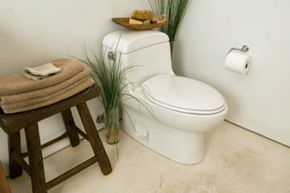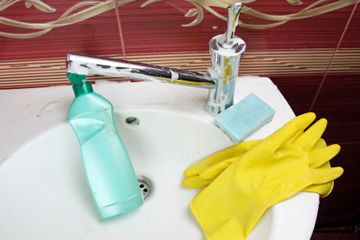Life is full of cumbersome questions like this one that don't fall neatly into a 25-word mini-lesson about manners and courtesy. Here are a few others: Do you take a bath before visiting the doctor, or brush your teeth before taking a trip to the dentist? Do you wash your hair before a Saturday morning trip to the barber? Should you provide beverages to those hot, dusty workers putting in your new pool or tarring your roof? These situations all sound pretty different, but they have something in common -- civility. You know the Golden Rule about doing unto others -- but it's a paltry kind of guideline for polite conduct unless everyone is playing by the same rules, right? The world is changing. People are too busy to worry about the niceties. So why clean the toilet when you'll just have to do it again after the plumber leaves? He's probably familiar with all kinds of nasty messes anyway, right?
What if your plumber is just an average Joe trying to earn a decent living in a tough economy like everyone else? Does his hourly rate include dealing with grunge and nasty floaties you could have dispatched with a bucket and some disinfectant? Because he charges more than the guy who mows your lawn, should he be the target of your dissatisfaction? If you're paying him a princely sum, should you be able to expect him to handle the nasty stuff? After all, he's the one scoring the big payday. Does the rate he charges make a difference? Where does the karma of courtesy fit into that equation?
Advertisement
Could the answer lie in proximity? If your plumber has a shop near your brother's pharmacy, or your daughter's daycare, maybe the idea of him chatting with your brother about the grody condition of your guest bathroom is enough incentive to put the old rubber gloves on. But is that right -- for courtesy to count only when there's a personal connection, or when people are watching?
Chivalry may be dead and Southern hospitality may be on its last legs, but maybe the answer to the plumber question (and the others raised here), is hidden in those two concepts. They're both about a code of conduct as a function of character -- not the plumber's character, yours. Think of it this way: Mercy, justice, honor and courtesy don't exist in nature. We, people just like us, tether those ideas to the society we live in. We perpetuate them and preserve them from one generation to another by the way we behave -- often in little ways.
The courtesy you show the plumber today won't be fun, and it won't make you any cosmic brownie points, either. It will do something important, though. It will reinforce your membership in a social order that values consideration and kindness. Those things make the challenging task of living from day to day more gracious and pleasant for everyone. It could also save you some money in your wallet. If you plumber gets to your house and gets down to work on a clean toilet, it will likely cut down on the amount of time it takes him to finish the job. If he's being paid hourly, you won't have to fork over so much cash.
Sure, today you're cleaning the toilet, but tomorrow some kind stranger will loan you an umbrella in a downpour, or help you carry that heavy bag to your car. But even if there's no direct reward, being considerate is life- and character-affirming. It also shows your kids that polite conduct is about more than a perfunctory "please" and a hasty "thank you." If you live those principles, your kids will be more likely to value them -- and that could mean a better future for them and for us.
Advertisement






